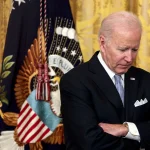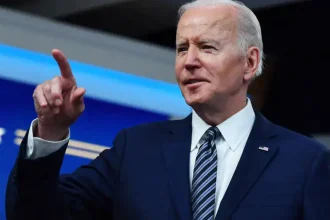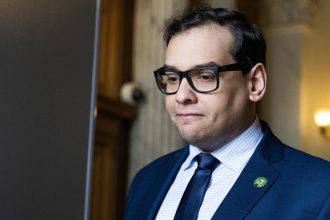The ceasefire between Israel and Hezbollah is increasingly fragile after both sides exchanged fire and accused each other of violating the US-brokered truce less than a week after it came into force.
On Monday night, the Israeli Defense Forces (IDF) announced that the Israeli Air Force (IAF) carried out extensive strikes targeting Hezbollah terrorists, rocket launchers, and other terrorist infrastructure across Lebanon. Among the targets was a Hezbollah launcher in the Berghoz area of southern Lebanon, which was struck shortly after Hezbollah fired two projectiles toward Mount Dov.
According to Lebanese authorities, which do not distinguish between Hezbollah operatives and civilians, ten people were killed in the Israeli strikes on Monday. Strikes were reported in the southern regions of Bint Jbeil and Marjayoun, as well as in the Hermel area near Lebanon’s northern border, and several border stations in Syria’s Homs province.
The Lebanese newspaper L’Orient-Le Jour reported that the United States and France requested the United Nations Security Council to meet on Wednesday to evaluate the ceasefire. Both countries have recently accused Israel of violating the terms of the ceasefire.
Following the strikes, the IDF said, “Hezbollah’s launches tonight constitute a violation of the ceasefire agreement between Israel and Lebanon. The State of Israel demands that the relevant parties in Lebanon prevent Hezbollah’s hostile activities from within Lebanese territory.”
The IDF also stated, “Israel remains committed to the terms of the ceasefire agreement in Lebanon. The IDF is prepared to continue operating wherever necessary to defend Israeli civilians.”
Several Israeli officials, including Benny Gantz, Chairman of the National Unity party, urged a strong response following Hezbollah’s launch of mortar grenades at Israel, which they viewed as the first significant breach of the ceasefire. “This is a time of trial. If we do not react strongly against Lebanon, we will return to an era of unrestrained hostilities,” Gantz said.
Mark Dubowitz, CEO of the Foundation for Defense of Democracies (FDD), echoed Gantz’s sentiment, adding, “Israel’s enemies and allies alike should recognize that October 7 marked a shift in Israel’s strategy. It will no longer accept short-term truces or cross-border attacks intended to test its resolve.”
However, Army Radio’s military correspondent Doron Kadosh criticized the Israeli response, questioning why no targets in or around Beirut were attacked. “Reports from Lebanon indicate most of the strikes were in southern Lebanon, which includes Hezbollah targets, violating the ceasefire agreement,” Kadosh said. “Why were these the only targets struck?”
The IDF reportedly held off from striking targets in Beirut following U.S. pressure, according to Channel 12.
Despite the strikes by both Hezbollah and Israel, U.S. State Department spokesman Matthew Miller insisted during a Monday briefing that the ceasefire had not yet completely broken down, suggesting that diplomatic efforts to prevent further escalation were still underway.
As both sides violate the ceasefire, tensions remain high, with the truce now facing a critical test. The situation’s outcome will depend on whether diplomacy can prevent further escalation.















